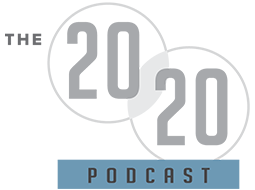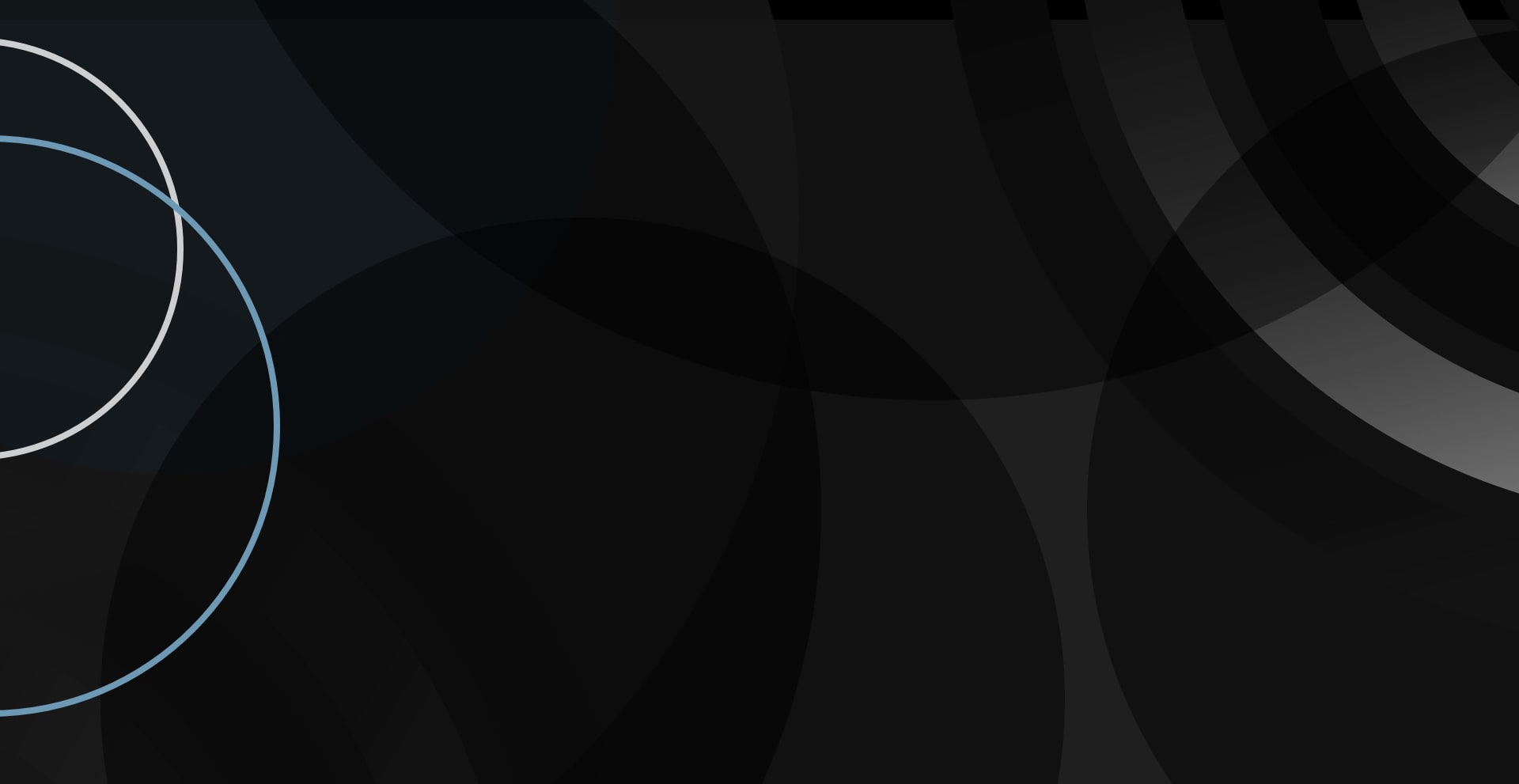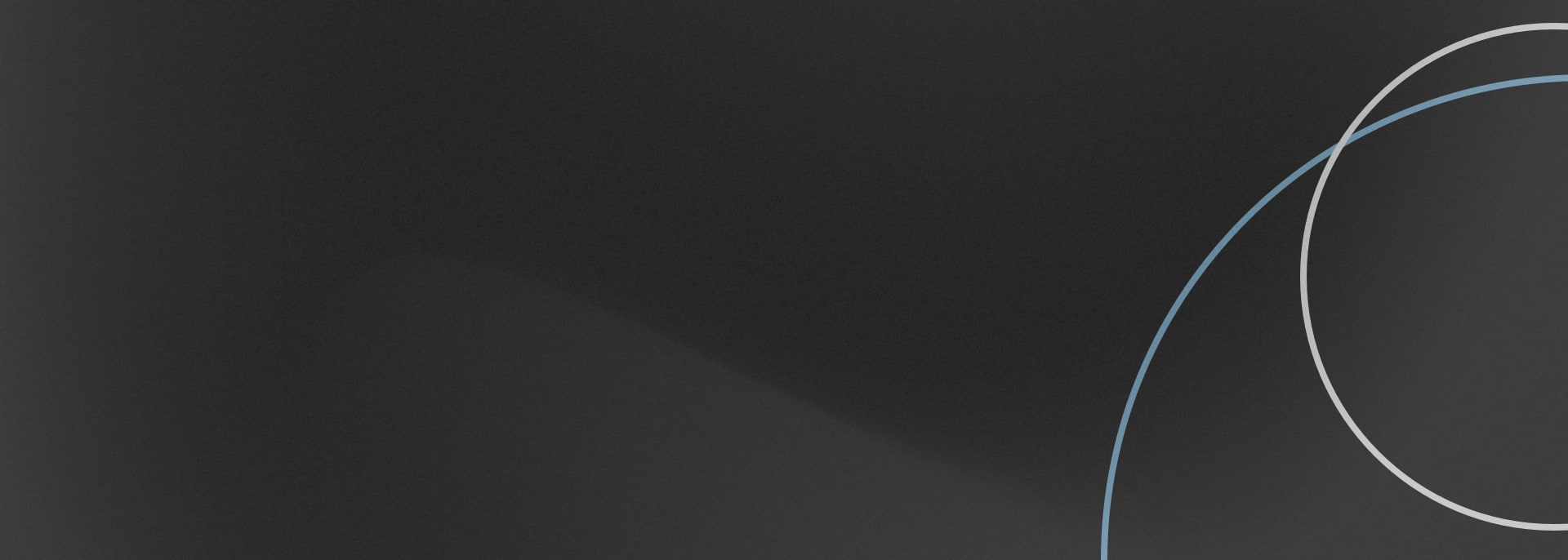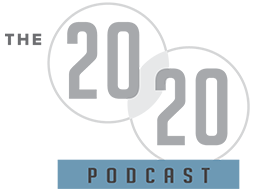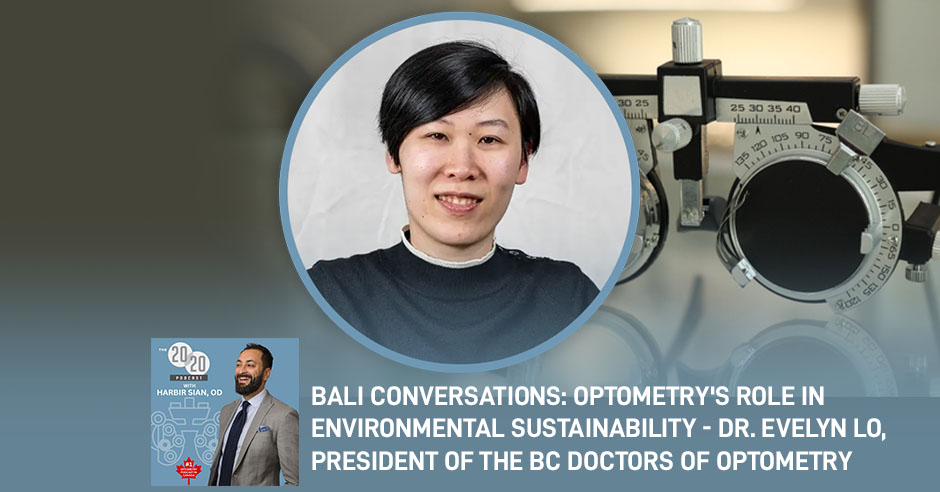
A couple of months ago, CooperVision hosted a unique experience in Bali, Indonesia to showcase its new sustainability partnership with Plastic Bank. While in Bali, I recorded three impactful interviews with three amazing guests: Dr. Evelyn Lo, David Katz, and Aldo Zucaro. In the first of the three interviews, I chat with Dr. Evelyn Lo – President of the BC Doctors of Optometry. The core question in this conversation is, “What can the profession of optometry do to help reduce its impact on the environment?”
Be sure to stay tuned for the remaining episodes to hear from the founder of Plastic Bank, David Katz, and the Environmental Sustainability lead at Cooper Companies, Aldo Zucaro.
—
Watch the episode here
Listen to the podcast here
Bali Conversations: Optometry’s Role In Environmental Sustainability – Dr. Evelyn Lo, President Of The BC Doctors Of Optometry
Introduction
Welcome back to another episode of Canada’s number-one optometry show. Thank you so much for taking the time to join me. As always, I’m so grateful. We have a series of special episodes coming up. Over the next few weeks, I’m going to slowly release three interviews that I did when I was down in Bali, Indonesia for this wonderful experience with CooperVision to learn about and experience their sustainability programs, their initiatives, and their partnership with a company called Plastic Bank.
While we were down there, we recorded three interviews. I wanted to share those with you. They’re short and sweet. They’re to the point. They’re quick and easy listens, but they’ll help you understand what’s happening out there in the landscape of sustainability, reducing carbon footprint, and all these types of things.
All of the large contact lens companies are doing something to this effect, so we’re going to hear a lot more about it as time goes on, and even the ophthalmic lens companies and so on. There’s so much waste that comes from all of the products that are developed in our industry. It’s cool to learn about what CooperVision is doing in particular. This episode is the first of those three interviews. I encourage you to go watch it on YouTube as I will share in the interview as well because the backdrop is stunning. It adds to the ambiance of the interview. If you’re going to listen, that’s okay.
The first interview is with Dr. Evelyn Lo whom I’m proud to call a friend and a colleague. She is the President of the BC Doctors of Optometry, our association here in BC. She shares great insight from her position as the president in this leadership role, what optometry as a whole or as a profession needs to do to be better, and what she is seeing that companies or other industry partners are doing.
There are some great insights. For example, you would guess daily disposable contacts may be more wasteful than monthly reusable contact lenses. You might be surprised to hear that there are different statistics on that. I’m not going to give it all away. I want you to tune in to this episode with Dr. Evelyn Lo. Stay tuned as I’ll be releasing a couple more of these interviews with different people that were down there in Bali. You’re going to like those. Thanks again for tuning in. Enjoy the episode.
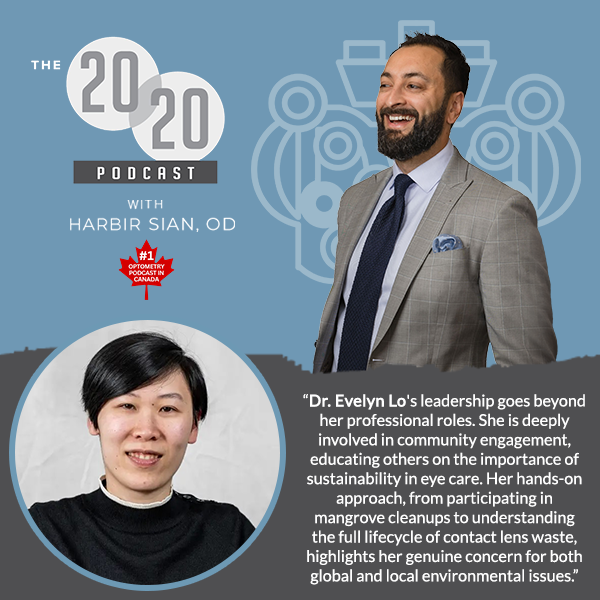
Welcome back to another episode of Canada’s number-one optometry show. Thank you so much for taking the time to join me. As always, I’m so grateful for everything that you do to support the show. As always, right off the top, I’m going to ask you a big favor. That is if you get some value from this conversation, please do share it with a friend. Send them a text, put a link on LinkedIn, or put a screenshot up on Instagram. Whatever you do, please do share it. We’re going to have some pretty fun conversations.
Environmental Sustainability
If you’re watching this on YouTube, you’re going to see that this is not our normal episode. If you’re not watching, please go to YouTube and watch this because you’re going to see that we are in a very special place. We are in Bali, Indonesia. I want to say a big thank you to CooperVision for bringing us out here to showcase the amazing sustainability initiatives that they have in place. That’s what we’re going to be talking about with my wonderful guest who is a repeat guest already. You were on not long ago. I’m so happy to have you back on. My guest is Dr. Evelyn Lo who is a Partner at Mt. Pleasant Optometry and the crowned President of the BC Doctors of Optometry. I’m so grateful to have you here, Evelyn. How amazing is this?
This is awesome.
We’re going to talk about why we’re in Bali. Before we get into that, maybe let’s talk a little bit about your role. You’re the newly appointed President of the BC Doctors of Optometry. Tell us what that entails.
BC Doctors of Optometry is the association for our members. We have about shy of 900 members.
Is it that many?
It’s that many. We can’t wait until we hit four digits.
That’s awesome.
One of our main missions is about making sure that we advance the profession and ensuring that we also make sure that our members are well taken care of, as well as the way that we practice.
The main topic of this conversation is going to be sustainability, environmental impact, and carbon footprint. Conversations like that and terms like that are a lot of what we’re going to talk about. It’s why we’re here in Bali. Let’s talk about this specific initiative with CooperVision, which is what has brought us here. Tell me from your perspective what has brought us here and why we’re here.
Part of why we’re here is to see what it is like for optometry to have more of a global impact on sustainability environmentally but also beyond that. It’s going to be social.
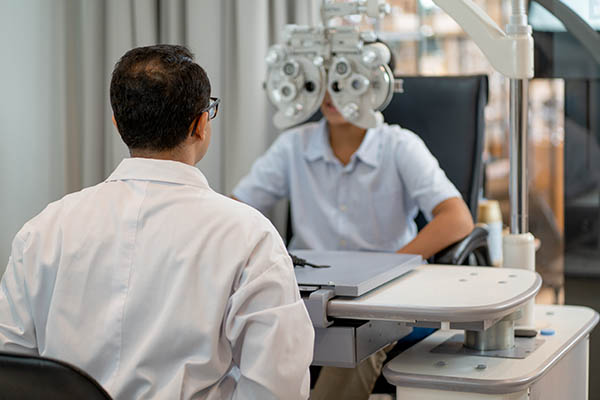
That’s huge. Let’s talk a little bit about some of the experiences that we’re getting. We’re not just sitting in the sun or sitting at the beach. What are we doing? What’s happening that we have to look forward to and that we are going to be excited to share with everybody after?
We’re going to be heading into the mangroves. We’re going to be seeing that and surveying that whole area to see what the plastic and the pollution are like. From there, we’re going to be picking up the trash. We’re going to be working with Plastic Bank and see how that entire process works out. From there, we’re going to be interacting with the actual communities and the individuals who, on a daily basis, pick up the plastic.
That’s amazing. I’m super excited about that too, all of those levels that you talked about. We’re going to be physically picking up the junk, the trash, and the plastic that’s in the water. We have to understand what the process is of collecting these materials. We’re going to be going into the plant where that plastic is processed and turned into other more useful things.
We’re also meeting some of the locals and spending time with them to understand what their lives are like and how this process and this collaboration between CooperVision and Plastic Bank is affecting the locals and the individuals here in Bali. That’s a lot of what we’re going to be doing. I’m very excited to share that with you.
That content, we’re going to share as much as we can even before this episode goes live. By the time you’re tuning in to this, you may have already seen us share some of this. If you haven’t seen it, go look for it, whether it’s on Instagram or YouTube. I want to make sure everybody sees this experience that we’ve had here and the impact it’s having not just across the world but maybe more importantly locally on the individuals here who are doing the work. The idea of sustainability and environmental impact is a hot topic for a lot of people. That could be for our customers or our patients. It’s top of mind for a lot of people. From your perspective, what do you think eyecare is doing as far as putting an effort towards sustainability?
We can start with the contact lens companies. The major contact companies, in general, are doing their job at least to try and say, “How can we minimize that impact to reduce the packaging waste?” How do they make their actual manufacturing process a little bit more sustainable or environmentally friendly? Some of the other things that we may need to consider hopefully in the future also are how we educate and bring awareness to sustainability around contact lenses and making it more environmentally friendly for our consumers and our patients. That will start at the association level.
Educating and raising awareness about sustainable contact lenses is crucial. We need to make them more environmentally friendly for both consumers and patients.
On the education side of things. We’re here on behalf of CooperVision. You’ve made this reference on the eyecare side of things. One of the first places our mind will go to is contact lenses and the potential impact they have. One of the arguments people in general will make or maybe our patients will make towards us is that daily disposables are having more of an impact. What are your thoughts, and what do you understand about that?
My understanding, and I’m no expert on this, is that the amount of waste that comes through to make a contact lens that’s a daily contact lens versus a monthly contact lens is about the same.
That’s interesting. I would not have guessed that. If you do the simple math, if I’m buying monthly lenses, I’m buying 24 lenses for the year. Let’s say, if I’m wearing them 7 days a week, I’m buying 365 times 2, which is 730 lenses. You would expect that the impact of 730 lenses is going to be greater on the environment than 24.
That’s the thought process for me initially as well until we thought about if you’re in a monthly lens and I have to buy the solution, which comes into this large bottle. I have to bring and ship that solution from the plant to whichever distributor. From there, we have to go and pick up that, buy it, and bring it home. All of that is a carbon footprint. When you add that and factor that all in, you realize that they’re not that different.
That’s interesting. This is not a rehearsed conversation here because I’m learning from Evelyn as we’re talking at the moment. If we shift the conversation or our mindset from waste in landfills to carbon footprint, carbon footprint may be more of a greater, larger perspective. In that case, monthly lenses have a greater carbon footprint impact on the environment.
We’re looking at long-term impact. That’s my understanding of that. We also have to keep in mind that as an optometrist, my biggest initiative and biggest reason why I do what I do is because it has to be in the best interest of the patient. If the patient’s eyes are not going to be healthy, what’s the point? In many ways, the daily is still going to be my best and first option for most of my patients.
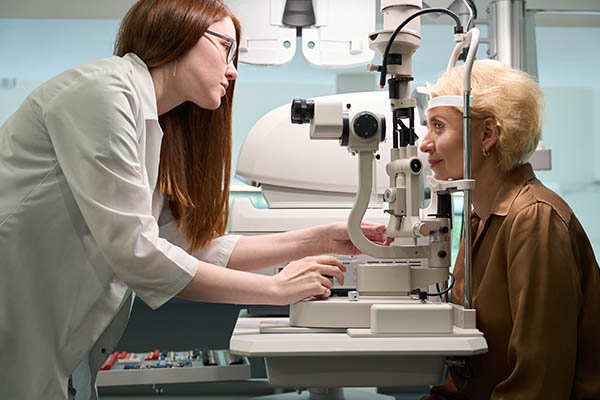
That’s something that many of us can agree on. As eyecare professionals, we understand the health benefits of a daily disposable versus a monthly, but that environmental impact is something that’s held us back. That’s a challenge that our patients have given us as well. It seems to me that dailies would have a greater environmental impact, but it sounds like the research is showing the opposite.
At least similar.
If we’re weighing them out that the environmental impact is similar but the health benefits are greater, then that tips the scales. Given where we are, from your position as the president, you get to see things a little bit differently than the rest of us who are not in a leadership position and not seeing the profession from this particular perch that you’re at. What do you think eyecare can do to move forward here?
The number one thing is raising awareness about how to properly dispose of our contact lenses. We don’t do a good job of this. In some of the stats I was looking at, about 20% of patients still throw their contact lenses down the drain. The issue with this is you’re like, “It happens once.” You take your contact lens out and it slips. It’s gone.
Every individual who is doing this, let’s say they’re in a daily, the small plastic, when it goes through that filtration system, it’s not biodegradable at this point. When it goes through that system, it might tear and may break down, but it doesn’t completely disintegrate. The problem with that is we’ve created microplastic. I’m not an expert on this, but microplastic, from what we do know, ends up in our oceans. The problem with that is it ends up in our fish.
They eat it.
They do eat it and then we eat the fish. The problem with that is that this is a full-on effect. It’s bioaccumulation of the fish with the amount of toxins that they’re getting. It’s going to be something that blows up because it affects the entire food chain.
I never thought of it from that level. We’re getting this amazing education lesson here on not just sustainability but the biological hierarchy in the food chain. That’s amazing.
You got to realize my degree back in the day was going to be in Marine Science.
BC Doctors Of Optometry & Sustainability
That makes a lot of sense. I appreciate that education. That’s something that maybe more of us need to look into a little bit more. From your position at the BCDO, does the BCDO have any initiatives in place? Is the BCDO actively doing anything to help with this specific topic of sustainability?
Number one is going to be awareness. There will be more things that you’re going to see us roll out that will be about sustainability in general. From an organizational point of view, it starts internally. With our brand new team at BCDO, the good thing is they have a lot more new ways of thinking, and we endorse that. On that level, our staff has been very proactive in saying, “If we’re going to consider this option and we’ll be working with this company, is it because they have values that also will encompass sustainability?”
Is there anything else you want to say on the topic before we wrap up? Do you have any other important messages you want to share with our colleagues or anybody else in the eyecare industry out there?
The biggest thing is to remind ourselves that when we’re talking about sustainability, we’re not talking just about the environment. We’re talking about if there’s a healthy planet, there’s going to be healthy people and healthy communities. Having these things, they’re all interconnected. As long as we can do all of them together in harmony, that’s when we’re going to find that there’s going to be the greatest amount of benefit for everybody.
Sustainability isn’t just about the environment. It’s about a healthy planet that fosters healthy people and healthy communities.
We’re supporting the environment but also supporting the communities. Bringing it full circle again, that’s why we’re here in Bali. It is to experience what this partnership with CooperVision and Plastic Bank is about, and that is that. It’s not just, “Let’s pick trash out of the ocean.” It’s, “Let’s support the communities, the locals, and the individuals.” They go out and remove the plastic. That plastic is then turned into something else. Overall, the impact is greater. It’s not just about the environment, it’s the communities as well.
We’re looking for social responsibility.
Closing
That’s a good term. Thank you for being on the show again. I appreciate it. It’s a pleasure, especially here in beautiful, warm, sunny Bali. Thank you to CooperVision again for having us here and for developing this amazing initiative in sustainability and this partnership with Plastic Bank, which we’re going to be learning more about. We both will report back to you after we go into the mangroves to physically remove trash from the water and witness what it goes through as far as the processing. Thank you for tuning in to Canada’s number one optometry show. We’ll see you guys in the next episode.
Important Links
- BC Doctors of Optometry
- YouTube – Dr. Harbir Sian
- Instagram – Dr. Harbir Sian, Optometrist
About Dr. Evelyn Lo

Dr. Evelyn Lo is co-owner of Mt. Pleasant Optometry in Vancouver. She is also the President of the BC Doctors of Optometry.
